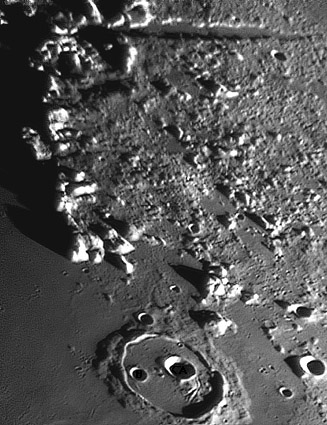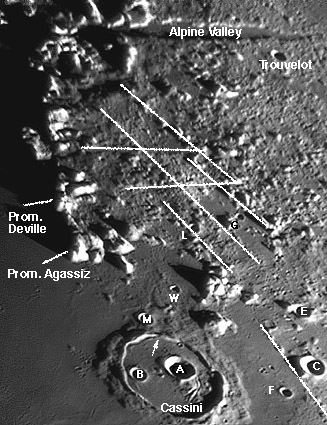April 18, 2015
Cassini North
Originally published April 17, 2004
Image Credit: Tom Leech |
|
Cassini North Cassini is an unusual looking crater. I think its because it is surrounded by Imbrium lavas so there is an abrupt boundary with its near rim deposits, and because it is filled with lava nearly to its rim. Cassini is a more extreme version of Archimedes. The interior of Cassini (diameter 57 km, depth 1.3 km) has peculiar hills and coarse rilles just inside its eastern rim - they don't look like remnants of a terraced wall. Along its northwest inner wall a weird little worm-like feature goes from the floor over the rim. The Lunar Orbiter IV view doesn't clarify the origin of this worm. The area north of Cassini is the lunar Alps with a front of massive mountainous blocks (massifs) and much smaller scattered hills behind. The Alps are probably crustal rocks uplifted by the Imbrium basin formation, and the smaller hills are ejecta fallback from the event. There was more than just fallback going on though. On the mouseover you will see various sets of white lines that highlight linear features in the Alpes Formation (as the US Geological Survey calls it). Some lines are radial to the Imbrium basin - they probably represent crustal fractures as the pre-existing rocks were being domed up in response to the impact "explosion." Other lines, nearly at right angles to the radial set, define a linear trough that has subsided - it is filled with lavas in places. I wonder if this is equivalent to a terrace in an impact crater? Look around this marvelous image by Tom Leech to find other details we don't fully understand - it's not that they are mysteries, rather the cratering process is very complicated; we need to examine this stuff on the ground! Technical Details: Related Links: Yesterday's LPOD: Eastern Rays Tomorrow's LPOD: Langrenus |
Author & Editor:
Charles A. Wood
COMMENTS?
Register, Log in, and join in the comments.





